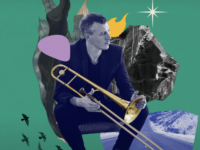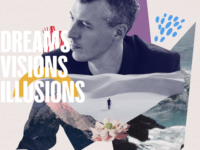Nick Finzer joined Preston Frazier to discuss ‘Dreams, Visions, Illusions,’ his sixth album as a band leader. Finzer launched a tour to support the LP earlier this month:
PRESTON FRAZIER: Your last album was Out of Focus, but that was an album of covers, right?
NICK FINZER: Yes, That record was a pandemic project; that was something to keep me busy. Yes, it was mostly covers. It was just a fun time, overdubbing trombone solos and collaborating remotely with some people that I hadn’t gotten the chance to do so in a long time. Dreams, Visions, Illusions was the result of a Chamber of Music America New Jazz Works grant, which I was thankful to receive. It’s is an album that has three parts, and all original music this time.
PRESTON FRAZIER: Your last album of original music was Cast of Characters, from 2020. What was your plan after you completed that?
NICK FINZER: It actually came out on February 29th; I remember picking Leap Day in 2020. We were on the road halfway through the tour, maybe not even halfway, and we had to go home. Yeah, it’s been an interesting journey between then and now. That album, Cast of Characters, was kind of the impetus for being able to get the grant and have my band be consistent and be able to get those guys to come and play with me some more. It was a great chance to be able to revisit not only that material and that concept, but kind of develop it more. I’ve had that same sextet since the first record, which came out in 2013. So it’s been about 10 years now of the kind of dealing with these musicians and this setting.
Dreams, Visions, Illusions features Lucas Pino on bass clarinet and saxophone, Alex Wintz on guitar, Glenn Zalenski on piano, Dave Baron on bass and Jimmy Macbride on drums. The album was a result of writing around these guys that I’ve grown to know and love. With grants, there’s certain order of operations that happen and so you get the grant, but then you write the piece and then you get some of the funding to be able to go and do the premiere of the piece. We premiered the piece last summer in New York and Boston. We played at Dizzy’s, at Jazz Lincoln Center in New York, and then right after that we went into the studio to get that recorded – and then now it’s finally coming out. So I got the grant in 2020, wrote it in 2021 and premiered it in 2022 – so, it’s been a while. Lucas and I, for example, have a kind of a similar way of thinking about how we write music and orchestrate music. So like that was a easy fit, and I was playing in his band and he plays in my band. And so having some similar people between our bands has been a nice continuation.
PRESTON FRAZIER: You did all the writing yourself, and I assume that the band helped with the arranging?
NICK FINZER: Not so much. I mean, it kind of was pretty fully realized knowing how they play at this point. They had great input; we definitely made changes. Sometimes, the further down the road you get with writing music, the more specific you end up because they’ve come more fully formed to your consciousness. These guys definitely brought it to life.
PRESTON FRAZIER: Where did you record it?
NICK FINZER: We recorded in Brooklyn. There’s a great studio we’ve made a bunch of records at called the Bunker Studio in Williamsburg. It’s a go-to for New York projects. We got together for two days of rehearsal, to workshop stuff. By the time we were done doing the premieres, we had workshopped it once already, and then we did like one rehearsal. Then we did the gig at Dizzy’s, and then the next day we went into the studio. I’ve always done all my records in one day, so we just did it in one day. The next day we played in Boston, so we kind of did it back to back to back. It feels better usually to do the same piece a couple times so that by that third, fourth, fifth time you play through it, it’s got a kind of a life of its own. Actually, we recorded up in Boston. After the record comes out sometime in the summer, I’m gonna release the live version.
PRESTON FRAZIER: How has the recording process changed from this album since you did Cast of Characters?
NICK FINZER: I think I have personally become able to be more detached from my own playing and be more accepting of what ever’s happening in the moment. I’m just really happy just to play the music with these musicians and get it down. So for me, I had grown in that way. I guess the recording process was similar, but for me, I had grown to be more accepting. There may be a couple little warts here and there but I want to hear the humanity in the music, too.
PRESTON FRAZIER: You have founded a record company; you do promotion for the albums. You have a solo career which has gone on for a while, and you’re an educator. Do these factors impact how you approach the music?
NICK FINZER: I think the answer is yes. I mean, I don’t think you can escape how your teaching affects your musicianship. That’s for sure. I think the biggest way that it impacts you is that you have to figure out a way to explain the unexplainable all the time to students. And so you get better at explaining concepts that have no clear definition yet have no clear methodology.
I always struggled with some of my teachers coming up with that. They would do something and I’d be like, “How do you do that?” And they’re like, “Oh, I don’t know – you just do it.” You just kind of imagine this thing and then you kind of create, find a way to create that sound or to navigate the situation. The more you try to explain it, the more you can try to help the students. So in that way, I think that’s probably the biggest impact, how teaching has impacted my writing or arranging. It’s just trying to explain it to somebody else. I wish there was a secret code, man. It would make life way easier.
PRESTON FRAZIER: Let’s discuss some of the songs on Dreams, Visions, Illusions, starting with the first track, “To Dream a Bigger Dream.”
NICK FINZER: The album is about the whole creative journey, and reflects on the creative process or kind of growing up in a creative life. “To Dream a Bigger Dream” is partially about opening yourself up to the possibilities of what could be. I was thinking, “Could I move to New York? Could I play with these people?” It’s kind of about witnessing and absorbing, and that kind of the energy.
PRESTON FRAZIER: Right now, my favorite song on the album is “Follow Your Heart.”
NICK FINZER: “Dreamer a Bigger Dream” goes into aspirations and convictions, which blends into “Follow Your Heart.” It’s kind of tongue-in-cheek, asking: “What does that saying even mean?”
PRESTON FRAZIER: I think that song has was one of Alex’s more aggressive solos too on the album.
How about the song, “To the ‘Top'”?
NICK FINZER: That one is kind of the beginning of the self-actualization, of kind of realizing what something is. “To the ‘Top'” is about reaching the summit of this journey, whatever the goal.
- Thelonious Monk – ‘Thelonious Himself’ (1957; 2025 vinyl reissue) - May 26, 2025
- Ben Tweedt – ‘Life Cycle’ (2025) - May 25, 2025
- Fernando Perdomo – ‘Waves 5’ (2025) - May 13, 2025




